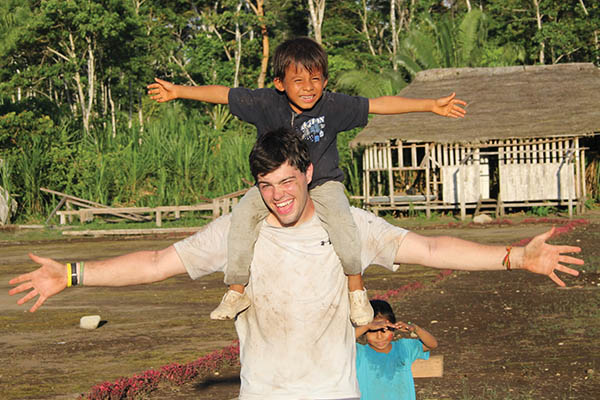We are looking to go into Ecuador to reach the unreached.”
No, that’s not a quote from 1931 when Clarence Jones first started a Christian radio station to reach the unreached in Ecuador. It’s a statement that was shared this week, in 2019.
The Church in Ecuador is thriving. The country is considered reached. But a curious thing is happening in the world. As unreached places become more difficult to access, unreached people are beginning to move. And we want to follow them.
 As a missionary-sending organization, we send workers to where Jesus is least known. We want unreached people everywhere to hear about Jesus, see Him in action and learn how to follow Him. Sometimes this means sending workers to hard-to-reach places in Asia, Africa and the Middle East. But it also means looking for where God is opening doors.
As a missionary-sending organization, we send workers to where Jesus is least known. We want unreached people everywhere to hear about Jesus, see Him in action and learn how to follow Him. Sometimes this means sending workers to hard-to-reach places in Asia, Africa and the Middle East. But it also means looking for where God is opening doors.
When Jesus instructed His disciples (and all of us) to “go therefore and make disciples of all nations,” (Matt. 28:19a ESV) the word He used for nations was not referring to countries. He actually was talking about ethnicities, or specific people groups. We define people groups based on their ethnolinguistic uniqueness.
Joshua Project says, “for evangelization purposes, a people group is the largest group within which the Gospel can spread as a church planting movement without encountering barriers of understanding or acceptance.” Within one country, there may be hundreds of individual people groups. Due to language, religion, location, caste or cultural differences, there is a barrier for the Gospel to spread from one group to another.
However, you can also find one people group spread across many countries. The current refugee crisis makes this even more of a reality. To reach an unreached Afghan, you can try to send evangelistic resources into Afghanistan, or you can look for the Afghan refugee populations closer to home.
Which is why, years after considering Ecuador a “reached” place, we are now looking at sending missionaries back.
Ecuador is an open-door country. There are no visa requirements to enter, making it an attractive option for refugees. Within Ecuador, you can find an emigrational path of different self-contained communities, or safe houses, of displaced people groups. People groups from the Middle East, Central Asia and the former Soviet Union can’t travel through Europe, so they find other ways.
Not only is Ecuador an attractive option for these diaspora populations, but we have an established network of places where we can send missionaries.
The English Fellowship Church (EFC) in Quito, Ecuador is a church that serves an international and intercultural population in Quito. The church was “born” in the hearts and minds of D.S. and Erma Clark, a British couple from Jamaica who had come to Ecuador as missionaries with Christian Missionary Alliance. They wanted to minister to people who were far from home and had a desire or need for Jesus-focused fellowship in their native language. Their gatherings moved to the HCJB office building in 1939, and then eventually HCJB built a new church for them on their property. Although EFC is now an independent entity in Quito, there is a long-standing relationship with Reach Beyond/HCJB.
Today, EFC serves many diaspora populations, both in Quito and around the globe. One couple attending EFC came from a closed-access country, and through the help of Reach Beyond and EFC, they are now able to broadcast the Gospel message back to their country in their heart language. It is a thriving ministry opportunity. By sending more missionaries into Quito, there is an opportunity to share the Gospel with even more people groups.
In addition to serving the diaspora groups in Ecuador, there is also an opportunity to train up Latin missionaries to serve overseas. Because of Arabic influences on Spanish, it is easier for Latinos to learn the Arabic language and culture. While there are many opportunities to serve Arabic populations in Quito, there is also an opportunity to train up missionaries to serve in Arabic countries. By sending U.S. doctors to work alongside our colleagues and partners at Hospital Vozandes and other medical clinics, we can help train and mentor other young doctors to serve in missions.
As the world gets smaller and more diverse, the task of reaching unreached people groups also becomes more diverse. Whether we serve in the field or at home, we simply need to look for the doors God is opening and obey.
“I have but one passion: It is He, it is He alone. The world is the field and the field is the world; and henceforth that country shall be my home where I can be most used in winning souls for Christ.” –Count Nicolaus Ludwig von Zinzendorf, an 18th Century Christian missionary pioneer
